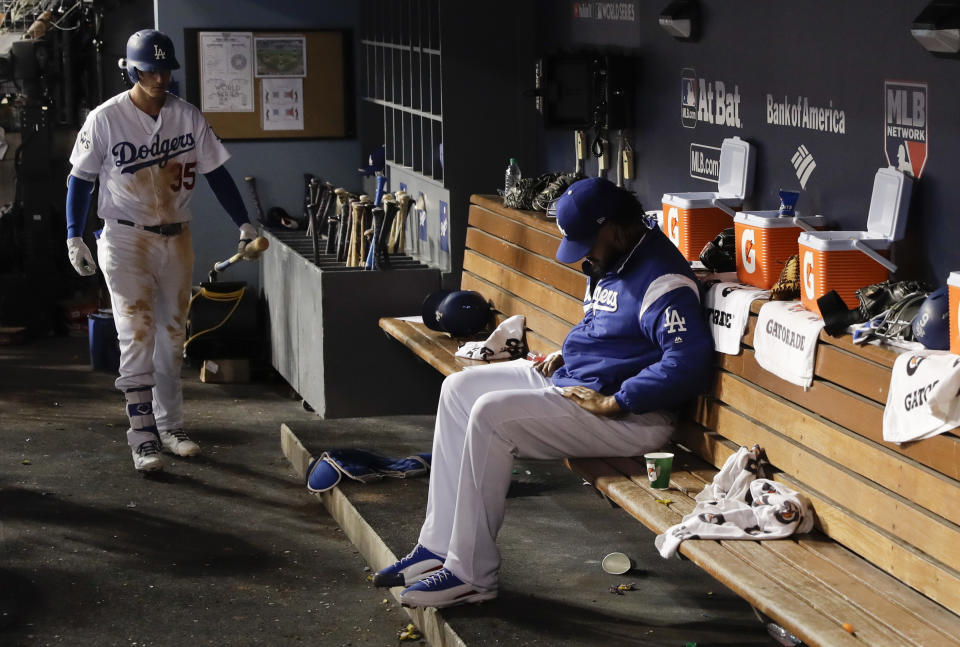World Series Game 6 could hinge on avoiding the bullpens
We’re finally coming down to it in the 2017 World Series. Game 6 is on Tuesday night, and the Houston Astros lead the Los Angeles Dodgers three games to two. A win for the Astros means their first World Series Championship ever. A win for the Dodgers means they force a winner-take-all Game 7.
For Game 6, both teams are sending out their Game 2 starters. For the Astros, it’s Justin Verlander. For the Dodgers, it’s Rich Hill. The last time these two faced, off, Verlander allowed three runs on two hits over six innings, and Hill allowed one run on three hits over four innings. Neither starter would have a final impact on the game. Both bullpens came in and ended up blowing it at various points, leading to an 11-inning win for the Astros. Things are different this time, though. The Astros are playing to win it all, and the Dodgers are playing for one more game. No pressure, right?
Beyond the “normal” pressure of a Game 6, Verlander and Hill have even more on their shoulders: they are all that stands between their bullpens and the opposing team’s offense. A few weeks ago, when the playoffs had barely begun, this wouldn’t be an issue. Dave Roberts could keep Hill on a short leash and then let the bullpen take over, because the Dodgers bullpen was one of the best in baseball. But both teams have played a lot of games since the end of the regular season — the Astros have played 16 and the Dodgers 13 — and each one has been fraught with significance. The bullpens are tired, and it shows. The bullpens have decided three of the five World Series games thus far, and when a bullpen decides something, that usually means it’s giving up runs.

Take Kenley Jansen, perhaps the best and most dependable closer in the game. In the regular season, he had a stunning 1.32 ERA and 41 saves, and had allowed just five home runs all year. In the World Series (a small sample size, to be fair), Jansen has a 4.76 ERA and has allowed two home runs, nearly half of his 2017 total. He’s also allowed six hits and three total earned runs over just 5.2 innings. This isn’t the Jansen we know.
And Ken Giles. He had a regular season ERA of 2.30 along with 34 saves. His entire postseason has been a nightmare, but the World Series has been especially bad. He’s pitched 1.2 innings in two games and given up four hits, five runs, two walks and a homer. In Game 2, Giles gave up two runs in the tenth inning, including a solo homer to Yasiel Puig, which allowed the Dodgers to tie the game. The Astros eventually won that one, but he wasn’t as lucky in Game 4. The game was tied in the ninth when Giles came in, and when he left three batters later (without getting an out), the Dodgers were leading.
It’s worth noting that there have been significant complaints about the slickness of the World Series baseballs in the last week. And that could definitely be part of the issue here. But bullpens have been heavily used in the playoffs. Instead of worrying about what their starter will do in their third or fourth time through the order, the manager can play the match-ups and put in a fresh arm.
But what happens when that stops working? We’ll find out on Tuesday night. Because both Dave Roberts and A.J. Hinch are going to ask for everything their starters can give. And with everything on the line in their final starts of 2017, Verlander and Hill are going to give everything they have and hope it’s enough.
– – – – – –
Liz Roscher is a writer for Big League Stew on Yahoo Sports. Have a tip? Email her at lizroscher@yahoo.com or follow her on twitter! Follow @lizroscher
More from Yahoo Sports:
• What Garoppolo trade tells us about Belichick
• Refs leave field after high school anthem protest
• NFL-best Eagles improve with trade for Pro Bowl RB
• Jackie Robinson cap testifies to racist era


